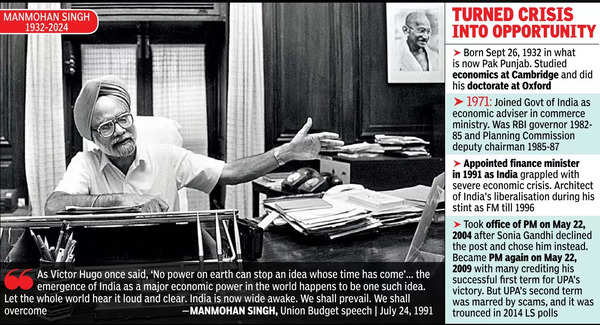NEW DELHI: It was likely his darkest hour as PM – the shine of popular approbation, a key factor in Congress-led alliance’s 2009 election win, had worn off, to be replaced by ominous clouds with nary a silver lining in sight. But Singh, then at the helm of UPA-2’s scandals-hit govt, where ministerial bickerings were routine, had a different take. “History will be more kind to me,” he said.
He was right. And anyone, no matter their politics, would have agreed with Dr Singh’s self-assessment as news broke that he breathed his last in AIIMS on Thursday, on a cold, foggy Delhi evening.
No Indian PM could match him in nonchalance when facing a blizzard of bad news. Recall those days – Commonwealth scam, 2G scam, coal scam, Manmohan’s big mantris behaving as if they didn’t have a boss, Rahul Gandhi tearing up a bill okayed by Singh govt that opened a backdoor for convicted netas to come back to electoral politics.
What informed the serene Sikh’s cool self-confidence in the face of excoriating banner headlines on corruption and dysfunction? One, Singh was, in public life, unflappable. Two, he knew, even if his critics forgot in the heat of news, his legacy as the man who changed India’s economic destiny was unchallengeable.

The journey to his taking charge of India’s economy showed another key trait in him. He was a determined pragmatist who smartly read the tea leaves of both politics and governance. When Indian Socialism was all the rage, he was an excellent technocrat serving the license-permit raj, When that very economic regime nearly brought India to ruin, and Narasimha Rao picked him – after IG Patel had turned down Rao’s offer to be FM – to save the economy by changing India’s economic DNA, Singh, with equal felicity, became the Sardar of Reforms. Communists and protection-loving corporate chiefs dissed Singh. It didn’t affect him one bit. The 1991 rewriting of industrial policy and the budget that followed are milestones in India’s evolution. If India is today reckoned globally as a serious economic player, if it’s pegged as a future economic heavyweight, if its markets and middle class are in MNCs’ and fund managers’ radars, it all goes back to those key calls taken by a quiet man.
Singh got CWC to twice endorse nuclear deal
Dr Singh’s story is all the more riveting because not just his ascension to FM, but even to the country’s top job were, as his former press adviser Sanjaya Baru had described, accidental.
He wouldn’t have been FM had Patel taken the job. He wouldn’t have been PM had Sonia Gandhi not decided to rule herself out of the job after Congress+ beat BJP+ in a dramatic upset in 2004.
The thing is he took to both jobs as if he were made for them. On May 19, 2004 evening, standing on the forecourt of Rashtrapati Bhavan with Singh at her side, Sonia announced him as PM by saying, “the country will be safe in Dr Manmohan Singh‘s hands”.
Her praise can be parsed in two ways. Safe for Gandhis because he would be loyal to the family, and safe for India because Singh’s competence and professional creds were never in doubt. Plus, there were the political returns for Congress in picking a Singh PM – 1984’s wounds and memories were still raw. Singh, despite his reforms record, was often thought as a political novice, especially against wily Congress netas who made a career out of Machiavellian durbar politics. Critics were wrong again. The 2008 nuclear deal with US, shepherded by him against not just BJP and CPM charges of selling the country down but also against disquiet inside Congress, was a masterclass in wiliness.
Singh got CWC to twice endorse the nuclear deal, shrugged off Left walking out of UPA-1, and won a LS vote of confidence. ‘Singh is King’, headlines said.
Singh is wise, was the verdict of many world leaders, notably Republican George Bush and his successor Democrat Barack Obama. Obama was particularly impressed. When G20 was born as the financial crisis upended a decade-long bull run everywhere, and various heads of govt spoke, Obama singled out Singh: “When Dr Singh speaks, the world listens”, the then US president said. But as happens in rough electoral politics, even the wisest leaders are not always listened to. Coming into 2009 LS polls, the economy just about emerging from the taper tantrum and his political and economic stewardship under the scanner, Congress took a drubbing against Modi-led BJP. Singh, both before and after results, spoke of the dangers of ‘majoritarianism’. A Partition refugee and a minority in Hindu-majority India, he probably had an acute personal attachment to secular politics. But it went beyond that. He was a political liberal by conviction. Singh’s comments on Modi could be seen as typical loser’s gripe. But there was more to it. He believed India couldn’t afford majoritarian politics.
